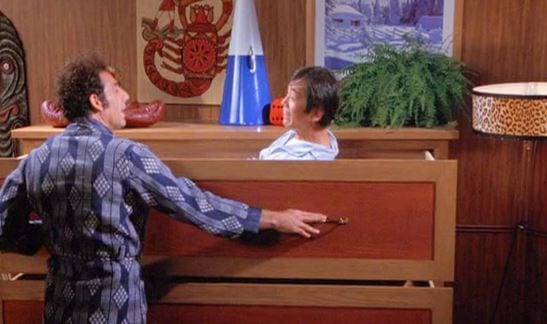Every time I revisit an old favorite, I always think to myself, “how did it age?” The results are usually mixed, though for the two NBC sitcom giants of the 90s—Seinfeld and Friends—the conclusion is clear: Seinfeld aged well, and Friends will soon fade into complete irrelevance. This is because shows about despicable people stand the test of time.
This really comes down to one principle that you probably see us talk about a lot here, which is “depiction vs. endorsement.” Just because Kramer and Newman try to enlist homeless individuals to pull rickshaws around New York City does not mean that the audience is expected to be supportive of this idea. The joke is on Kramer and Newman for being terrible. This is how it was intended to make us laugh in the 90s, and it is how it comes across today.
However, when Chandler Bing (someone who is supposed to be funny, and we know this because we are frequently told how humorous he is) tells Joey that he is “turning into a woman” for arranging flowers, and Joey responds by saying Chandler’s tone hurt his feelings, we are meant to laugh. Because…do you get it? Women tell men “it’s not what you said, it’s how you said it.” But it’s Joey saying it. A man.

On the podcast, we conceived of this as “punching down” vs. “punching up.” In the case of the rickshaws, the joke is at the expense of the two men in the positions of power, rather than the homeless men getting roped into their scheme. The joke with Joey arranging flowers, however, was solely about Joey eschewing his gender role. The punchline is…sexism. Which yes, I picked an example that painfully doesn’t time-travel, and maybe that’s unfair. After all, a lot can change in terms of cultural conversation and understanding in twenty years. It’s not to say “yeah it was totally fine to mock men for having hobbies traditionally associated with women back then,” but perhaps that the framework for content creators to even challenge such jokes really wasn’t around, at least not on a larger scale.
There’s also something to be said for a discomfort with Seinfeld using marginalized individuals as sort of props for the despicable main characters to react against. Of course it’s ridiculous when Kramer houses three Japanese tourists in a chest of drawers. But at the same time, the story revolves around three Japanese tourists who spend all their money and then willingly sleep in a stranger’s chest of drawers.

And like, none of this is really aided by Jerry Seinfeld making a strong and brave stance against that oppressive PC culture. As much as the show was on the right side of rickshaw-pulling, it’s pretty clear that it wasn’t because Jerry Seinfeld and Larry David were proto-intersectional feminists.
That’s why I have to think this goes beyond punching up and down. Yeah, having despicable protagonists meant that there couldn’t be sexist and racist jokes perpetrated in quite the same way as a typical TV show, but it’s not like it means Seinfeld was free of the same issues. For instance, Elaine’s whole “is he sponge-worthy” bit was entirely reliant on “women are so choosey” stereotype. Though I suppose you could argue it was purposely satirized given that the context was all about Elaine’s unabashed assertions of her sexual agency.

No, I think what separates these two shows is the concept depiction vs. endorsement on a larger scale, not just contextualized by issues of social justice. Whatever the situation may be, we are not meant to agree with the actions of Jerry, Elaine, Kramer, and George. Therefore, when these actions blow up in their face, it’s funny to us. The politics of it are really rather secondary.
I think the best example is George trying to avoid censure for sleeping with the office cleaning woman on his desk by pretending that no reasonable person would consider this a fireable offense:
Mr. Lippman: “I’m going to get right to the point. It has come to my attention that you and the cleaning woman have engaged in sexual intercourse on the desk in your office. Is that correct?”
George: “Who said that?”
Mr. Lippman: “She did.”
George: “Was that wrong? Should I have not done that? I tell you, I gotta plead ignorance on this thing because if anyone had said anything to me at all when I first started here that that sort of thing was frowned upon, you know, ‘cause I’ve worked in a lot of offices and I tell you people do that all the time.”
Like, of course this would never work! The joke lands now, as it did then, because anyone with an understanding of human behavior would know that this is so clearly a ridiculous thing to say in this situation, just as it’s ridiculous that Jerry wouldn’t give David Putty one last high-five to secure a great deal on his car, or that Elaine would market the “Urban Sombrero.”
In fact, one need look no further than Seinfeld’s finale to realize that we were never meant to empathize with these people, even for a little. In this [divisive] episode, literally all the characters the main four had come in contact with turn up to drag them, and the result of the experience is that they end up imprisoned for being Bad Samaritans.
Friends is a completely different case. I’d argue that the show’s finest moments come when there is a self-awareness to the jokes, like the Thanksgiving episode where Mrs. Geller decides she’s had it with everyone in the room.

In fact, a crucial component of that was Ross being the butt of the jokes, and I think that’s a very important thing, because Ross is an intolerable ass. If anyone can think of any redeeming qualities, I’m all ears, but I just draw blanks. He’s selfish, he’s entitled (particularly when it comes to Rachel’s affections), he’s jealous, he worries about his son’s manliness because Ben’’s being raised by *gasp* lesbians and played with a doll once, he’s petty, he has a continual victim-complex… No really, I can do this all day. I guess it’s neat that he likes dinosaurs?
What’s weird to me is that the show seems to realize all of this, at least to some extent. Like when he dates Janice because he’s upset Emily is remarrying so quickly, and Janice ends up dropping him for being too “whiny”, or when Rachel tries to tell him that she’s pregnant with their kid, and he can’t stop loudly complaining about a shampoo bottle that exploded in his suitcase. In fact, one of the best episodes in the show is when Ross learns that Rachel and Joey are dating, and acts completely irrationally the entire episode, which everyone else seems to recognize.

However, that same episode—sorry, “The One Where Ross Is Fine”—concludes in such a way that I think serves as a perfect microcosm for all my issues with Friends. Joey stays over to take care of Ross and tells him, as the bigger person, that if Ross has an issue with him dating Rachel, he’ll step aside. This is framed as perfectly reasonable, that Ross’s “history with Rachel” would elicit such a response from the guy in the first place. Ross then takes the even higher road, realizing how many years it’s actually been since he and Rachel were together (one night stand to produce Emma notwithstanding), and tells Joey that “maybe it’s time we all moved on” (um, Dingus…everyone else already did).
It might seem weird that what I have a problem with is Ross actually being not awful for a second, but it’s really more about the takeaway: that at the end of the day, Ross is just a good guy we’re meant to empathize with, and his actions go rewarded. He is framed as a great friend, no matter how completely unreasonable he had been during the episode itself, or hypocritical when he had spent the episodes just before this actively trying to steal Joey’s girlfriend. Not to mention this entire thing was just so dismissive of Rachel’s agency. For all the lip service to that Ross and Rachel “history,” it really made the most sense for this resolution to come between the two men?

And of course the conclusion of this show had to be Ross and Rachel getting back together. Icing on the cake there.
So really, I don’t think it’s the jokes at the expense of Chandler sexuality that make Friends lose-out to Seinfeld in the long-run, though they by no means help. It’s that it’s always going to be an uphill battle to have protagonists whose actions are reasonable not just in the moment, but years in retrospect as well. Our culture is continually changing, and the storytelling conventions that we find compelling or our conception of romantic behavior goes right along with that. Even without the total comedic clunkers mentioned, Friends had an impossible task.
Seinfeld, however, never had to worry about such things; it didn’t have to perfect, or even particularly forward-thinking to stay current. It was a show that punched down plenty; it was just never a show that expected us to punch along with it. That’s the key.
Images courtesy of NBC

